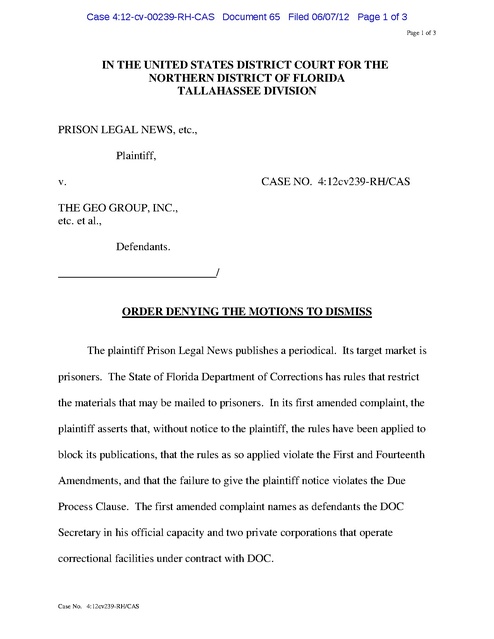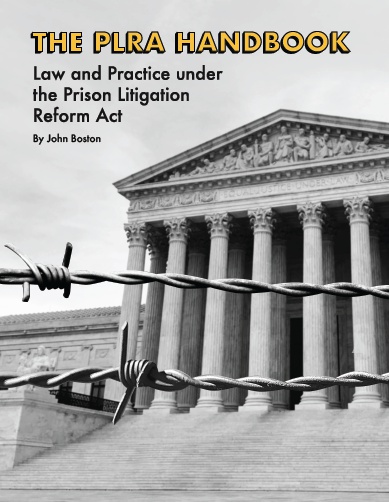Prison Legal News v. Mayo, Florida DOC, Order Denying Motion to Dismiss 2012
Download original document:

Document text

Document text
This text is machine-read, and may contain errors. Check the original document to verify accuracy.
Case 4:12-cv-00239-RH-CAS Document 65 Filed 06/07/12 Page 1 of 3 Page 1 of 3 IN THE UNITED STATES DISTRICT COURT FOR THE NORTHERN DISTRICT OF FLORIDA TALLAHASSEE DIVISION PRISON LEGAL NEWS, etc., Plaintiff, v. CASE NO. 4:12cv239-RH/CAS THE GEO GROUP, INC., etc. et al., Defendants. ____________________________/ ORDER DENYING THE MOTIONS TO DISMISS The plaintiff Prison Legal News publishes a periodical. Its target market is prisoners. The State of Florida Department of Corrections has rules that restrict the materials that may be mailed to prisoners. In its first amended complaint, the plaintiff asserts that, without notice to the plaintiff, the rules have been applied to block its publications, that the rules as so applied violate the First and Fourteenth Amendments, and that the failure to give the plaintiff notice violates the Due Process Clause. The first amended complaint names as defendants the DOC Secretary in his official capacity and two private corporations that operate correctional facilities under contract with DOC. Case No. 4:12cv239-RH/CAS Case 4:12-cv-00239-RH-CAS Document 65 Filed 06/07/12 Page 2 of 3 Page 2 of 3 The defendants have moved to dismiss the first amended complaint for failure to state a claim on which relief can be granted. The defendants’ primary assertion, in effect, is that the DOC rules are facially constitutional. But facially valid rules can be unconstitutionally applied. See, e.g., Thornburgh v. Abbott, 490 U.S. 401, 404, 419 (1989). Whether that has occurred here cannot properly be determined on the defendants’ motions to dismiss. This does not mean, though, that a determination of the as-applied claims must await prolonged discovery. See, e.g., Leatherman v. Tarrant Cnty. Narcotics Intelligence & Coordination Unit, 507 U.S. 163, 168-69 (1993) (“federal courts and litigants must rely on summary judgment and control of discovery to weed out unmeritorious claims sooner rather than later”). The attorneys should cooperate with the goal of efficiently preparing and presenting the case on the merits so that the side that is entitled to prevail—whether plaintiff or defendants—can do so without undue burden. That leaves for consideration the motion to dismiss the Due Process claims. The defendants are incorrect when they assert that notice to a publisher is never required. See Montcalm Publ’g. Corp. v. Beck, 80 F.3d 105, 109 (4th Cir. 1996); Martin v. Kelley, 803 F.2d 236, 243-44 (6th Cir. 1986); Jacklovich v. Simmons, 392 F.3d 420, 433-34 (10th Cir. 2004); see also Abdul Wali v. Coughlin, 754 F.2d 1015, 1027-28 (2d Cir. 1985); Trudeau v. Wyrick, 713 F.2d 1360, 1366-67 (8th Case No. 4:12cv239-RH/CAS Case 4:12-cv-00239-RH-CAS Document 65 Filed 06/07/12 Page 3 of 3 Page 3 of 3 Cir. 1983); Prison Legal News v. Cook, 238 F.3d 1145, 1152-53 (9th Cir. 2001). The first amended complaint adequately states a claim on which relief can be granted. For these reasons, IT IS ORDERED: The motions to dismiss for failure to state a claim on which relief can be granted, ECF No. 29 and 37, are DENIED. SO ORDERED on June 7, 2012. s/Robert L. Hinkle United States District Judge Case No. 4:12cv239-RH/CAS






